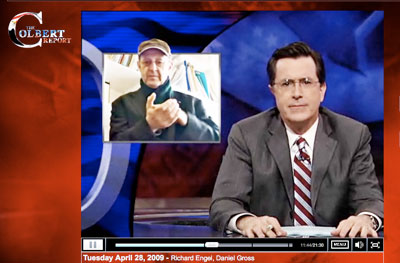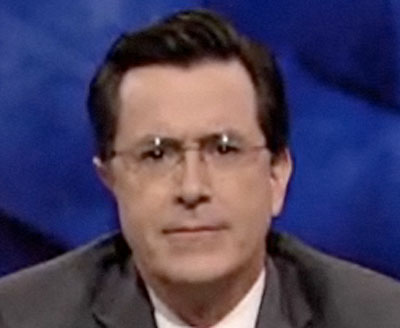Steve Reich 2009 Pulitzer (from Ronen) and John Zorn 2006 MacArthur Genius Grant mentions on The Colbert Report:
| The Colbert Report | Mon – Thurs 11:30pm / 10:30c | |||
| Who’s Not Honoring Me Now? – Emmys | ||||
|
||||
| The Colbert Report | Mon – Thurs 11:30pm / 10:30c | |||
| Who’s Not Honoring Me Now? – The MacArthur Foundation | ||||
|
||||
A few weeks back, I saw a young pianist perform an original composition of his, in addition to some standard piano works. I thought his piece was terrible, and left the concert at intermission. On the 1 train home, though, I wondered to myself, if it had been Nico‘s piece/playing, would I have enjoyed it? If it was David Lang’s, would I have thought it was good? Obviously we all support our friends (and in David’s case, friends and clients), but when you know an artist personally, can you ever be objective about his or her work?
And what happens when we all think we know an artist personally because he or she has achieved a certain level of fame; can anyone then be objective? Clearly Steve Reich “deserves”, by nearly any definition, a Pulitzer, but I think we “in the industry” often forgot how our heroes may be perceived by the world-at-large. Look at Colbert’s face after hearing a clip from Reich’s winning piece, Double Sextet:



Sure, Steve Reich “‘deserves'” a Pulitzer for “Double Sextet.” But what is his prize worth when the only standard that must be met is that the winning “musical composition” be “distinguished”? Since that term characterizes the winner in every category for which there is a prize, it is virtually meaningless.
You should have checked with your parents and sister before reporting that they would say of Reich’s piece, “I’m sure it’s . . . good, it’s just not my thing.” In any case, such words often mean that the speaker doesn’t want to offend, would rather be kind. Most ordinary people, I suspect, would not call Reich’s piece “good” at all. More likely, they would say they dislike it intensely and might even question its status as music.
Louis Torres, Co-Editor, Aristos / Co-Author ‘What Art Is: The Esthetic Theory of Ayn Rand’
Umm….
1. Steven Colbert is playing a *character* on the show. Obviously a right-wing blowhard like the guy he is impersonating would be unimpressed by Steve Reich’s music.
2. My mom (who is 70) loves Steve Reich. And she’s no avant-gardnick either, as the huge poster of Andrea Bocelli on her wall will attest.
3. Unless you’ve actually heard the piece – and not just the 2-second snippet of it obviously taken from a streaming mp3 at extremely low fidelity that appeared on the show – you really don’t know whether you would like it or not.
There’s no need to drink any Kool-Aid. The Double Sextet is an easy sell.
Robert is right. It’s “Colbert,” not Colbert, who is reacting (complete with facial expressions) as that character naturally would. In fact, the subtext of the whole bit is the fact that a major prime time TV show would even mention composers like Reich or Zorn. That in itself is subversive. As a publicist, you’ll appreciate the fact that most literary agents today now recognize both the Daily Show and Colbert as the most reliable and prominent television venues (aside from Oprah) where authors are frequent guests, their books touted. (How many other shows can you name that host as many authors?). Heck, Colbert even had Alex Ross on as a guest not too long ago to promote his book about the music of the 20th century!
When he had Alex Ross on his show, Colbert remarked he didn’t like jazz–“I call it ‘squeedly-dee music,'” he said. I wonder if any jazz fans fretted over that joke, afraid that maybe Duke Ellington hadn’t deserved his posthumous Pulitzer because he wasn’t mainstream enough?
Hey, Amanda.
Thanks for posting this. Those are some interesting questions to think about.
1. Does winning a mainstream award for music matter if the music is not mainstream?
I’ve been tracking activity on Steve Reich’s MySpace page and daily (compulsively) searching “reich, Pulitzer” on Twitter since posting the news.
Reich’s MySpace page has had about 11,000 hits (out of a total 509,607 since May 2006) and he has gained roughly 800 (of a total 36,249 “friends” (which I would call “subscribers”). At least one dude (Kevin/17/Ohio) left a comment saying, “I just found about you through the Colbert Report. And I’m sad I didn’t know you before. All I can say is….WOW.” He has added “Cello Counterpoint” to his favorite tracks on his home page.
re: Twitter — After subtracting my own “tweets” about the Reich Pulitzer, there have been roughly 105 tweets about the news and an additional 28 regarding Colbert. Mostly industry folks but also some fans. Not as many as one would hope.
I can’t speak for how this translates to sales. And, unfortunately the piece isn’t commercially recorded yet (and won’t be until 2011!), so neither can Nonesuch.
2./3. If we’ve (I’ve) drank the new music Kool-Aid, how I can effectively publicize it to people who haven’t? 3. If you care about, say, classical music enough to promote it as a career, how can you (I) possibly understand – and thus connect with – people who don’t care about it at all?
Good questions. Though I don’t know if Reich is the best example to use as case study. Sure, the “new music” world has put him on the A-list, but he has an ocean of underground/street cred. If you track his name in the news (and oh, I do), you’ll find a bottomless list of name-checks from DJ’s, indie rockers, and electronic(a) musicians, who credit him as one of their favorite/most influential musicians. Not so for, say, Carter or Del Tredici.
My approach has been to give those I consider “musical omnivores” the opportunity to hear our composers’ work and to let the music speak for itself. Sometimes they’re interested in how the music works “taped loops, overlapping” (Reich) or “taping the human voice reading a text and writing a piece around the pitches” (Reich, Chapela, etc) and that adds a cool factor. But the most important thing is giving people the chance to hear the music in the first place! Getting “new music” outside of itself and into people’s hands/ears/faces. Really, I consider that my greatest challenge.
Regarding the Colbert spot, I thought it was funny and pretty harmless though the Zorn segment was much funnier. The real Colbert is an opera lover, at least. I’m not sure about his musical tastes beyond that. His staff has welcomed a care package of Boosey & Hawkes music, saying they love discovering music of all genres. And, regarding “Double Sextet,” Colbert’s producer said “I’ve been listening to the full recording; it’s a great/intense piece of music.”
Anecdotal but that’s what I’ve got.